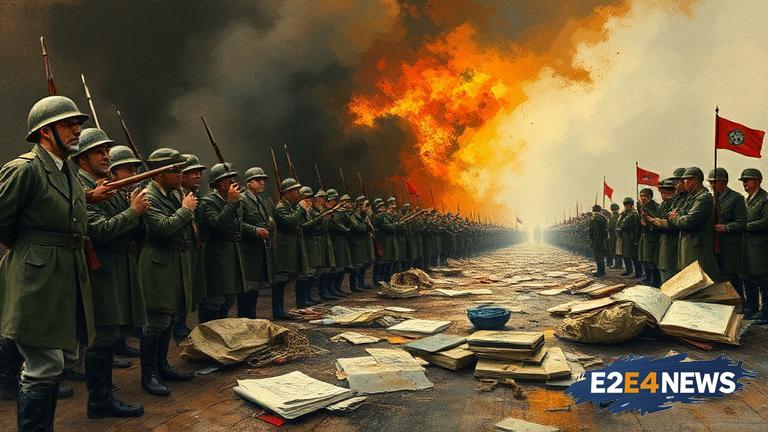Friedrich Nietzsche, a 19th-century German philosopher, is often misunderstood as a precursor to the ideologies that led to World War I. However, a closer examination of his work reveals a more nuanced and complex relationship between his ideas and the war. Nietzsche’s philosophy, particularly his concept of the ‘Will to Power,’ emphasized individual strength and self-overcoming, which was misinterpreted by some as a call to militarism and nationalism. Despite this, Nietzsche’s critiques of traditional morality and his concept of the ‘Übermensch’ (or ‘Superman’) were not inherently tied to the war effort. In fact, Nietzsche’s ideas were often used to justify the war, but his philosophy was also used by those who opposed the war, such as the German socialist party. The complexity of Nietzsche’s influence on the Great War is further complicated by the fact that his sister, Elisabeth Förster-Nietzsche, was a strong supporter of the German war effort and used her brother’s philosophy to justify her own nationalist views. Meanwhile, other philosophers, such as Martin Heidegger, were influenced by Nietzsche’s ideas and went on to develop their own philosophical perspectives on the war. The war itself was a culmination of various factors, including imperialism, nationalism, and militarism, which were not solely the result of Nietzsche’s philosophy. Nevertheless, Nietzsche’s ideas did play a role in shaping the intellectual and cultural landscape of Europe in the early 20th century. The concept of the ‘Will to Power’ was particularly influential, as it emphasized the importance of individual strength and self-overcoming in the face of adversity. This idea was often used to justify the war effort, as it was seen as a means of asserting national strength and dominance. However, Nietzsche’s philosophy was not limited to the concept of the ‘Will to Power,’ and his ideas on the importance of individual creativity and self-expression were also influential. The war had a profound impact on European society, leading to widespread destruction and loss of life. The aftermath of the war saw a significant shift in the intellectual and cultural landscape of Europe, as philosophers and thinkers grappled with the consequences of the war. Nietzsche’s philosophy continued to be influential, but it was also subject to criticism and reinterpretation. Some critics argued that Nietzsche’s ideas had contributed to the war, while others saw his philosophy as a means of understanding and responding to the war’s aftermath. The relationship between Nietzsche’s philosophy and the Great War is complex and multifaceted, and it continues to be the subject of ongoing debate and discussion. In recent years, there has been a growing recognition of the need to reevaluate Nietzsche’s philosophy in the context of the war, and to consider the ways in which his ideas were used and misused by various groups and individuals. This reevaluation has led to a more nuanced understanding of Nietzsche’s philosophy and its relationship to the war, and has highlighted the importance of considering the historical and cultural context in which his ideas were developed and received. The study of Nietzsche’s philosophy and its relationship to the Great War is an ongoing area of research and debate, and it continues to be an important topic of discussion in the fields of philosophy, history, and cultural studies. As such, it is essential to approach this topic with a critical and nuanced perspective, recognizing both the complexities of Nietzsche’s philosophy and the historical context in which it was developed. By doing so, we can gain a deeper understanding of the relationship between Nietzsche’s ideas and the Great War, and can work towards a more informed and nuanced understanding of this complex and multifaceted topic. Furthermore, the impact of Nietzsche’s philosophy on the war effort was not limited to the concept of the ‘Will to Power,’ but also extended to his ideas on the importance of individual creativity and self-expression. The war saw a significant increase in nationalist sentiment, which was often tied to Nietzsche’s concept of the ‘Übermensch.’ However, this concept was not inherently nationalist, and was often used to justify a range of different ideologies and perspectives. The complexity of Nietzsche’s influence on the Great War is further complicated by the fact that his philosophy was often used to justify contradictory ideologies and perspectives. For example, some socialists used Nietzsche’s ideas to justify their opposition to the war, while others used his philosophy to justify their support for the war effort. The relationship between Nietzsche’s philosophy and the Great War is a complex and multifaceted topic, and it continues to be the subject of ongoing debate and discussion. In order to fully understand this topic, it is essential to consider the historical and cultural context in which Nietzsche’s ideas were developed and received. This includes examining the social, political, and economic factors that contributed to the outbreak of the war, as well as the ways in which Nietzsche’s philosophy was used and misused by various groups and individuals. By taking a nuanced and multifaceted approach to this topic, we can gain a deeper understanding of the relationship between Nietzsche’s ideas and the Great War, and can work towards a more informed and nuanced understanding of this complex and multifaceted topic.
